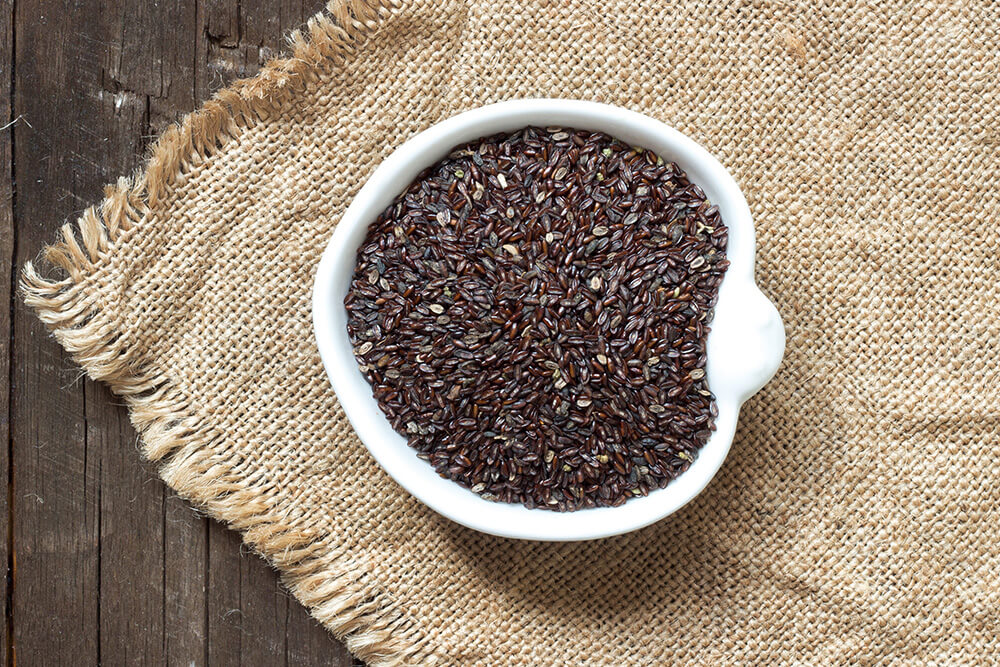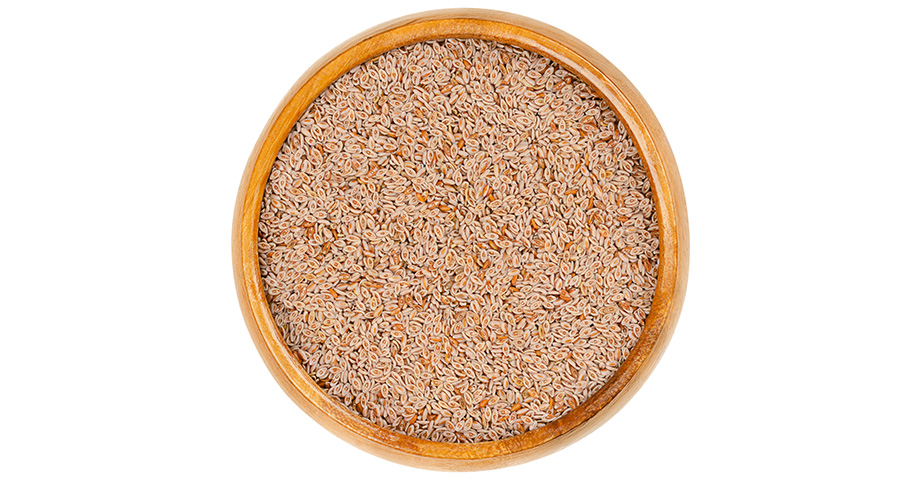Psyllium Husk - properties, use and health benefits

Plantain psyllium, also known as flea or flea seed, is a plant that occurs naturally in the Mediterranean, in areas of Asia and North Africa. Although it is still rarely talked about in Poland, the health benefits provided by its seeds have been known for millennia. Primarily, the seeds of the psyllium husk are distinguished by their high content of fiber and other valuable nutrients.
What is psyllium husk?
Psyllium husk (Mediterranean plantain, Latin: Plantago afra L.) is a plant of the plantain family with an upright shape. The psyllium husk has an upright-branching stem that usually reaches a height of 20-40 cm. The upper part of the stem is hairy, and the root of the plant itself is small and has many lateral branches. The leaves of the plant are hairy and lie opposite each other. Small four-part flowers grow from the angles of the leaves.
Psyllium husk seeds
Plantago afra also goes by the name Plantago psyllium L. The word psyllium comes from the Greek and means flea - referring to the distinctive appearance of psyllium husk seeds. The seeds are egg-shaped and elongated. One end of the seed is always wider. They are also silky to the touch. The seeds of the psyllium husk are distinguished by their brown color and their texture shines in the sunlight. A single seed is usually 1.3 to 2.7 mm long and is croissant in cross-section.
Psyllium husk - a valuable health plant
Psyllium husk has been used in folk medicine for hundreds of years. It owes its popularity to the wealth of nutrients found primarily in its seeds. An important component of plantain seeds is the mucilage found in the husk. Its main components are a soluble fraction of polysaccharides with acidic arabinoxylans, galacturonic acid and rhamnose, protein, fatty oil, palanteose, phytosterols, aucubines and triterpenes.
Psyllium husk in Poland
Psyllium husk still not popular in Poland. Despite its unique properties, its cultivation is still heavily restricted. Psyllium husk seeds are occasionally used in medicinal products (as is psyllium blond). In addition to seeds, psyllium husk is also used in herbal medicine.
Psyllium husk has a high fiber content. Natural vital fiber makes up more than two-thirds of each seed. Similar properties are shown by another plant of the plantain family - psyllium blond. In Poland, instead of Plantago psyllium and Plantago ovata, flaxseed is grown, which exhibits similar properties.
Psyllium husk and its use
Psyllium seeds are most commonly used for people who struggle with chronic constipation or acute infectious bowel disease. Researchers indicate that psyllium husk may have a temporary laxative effect, soften stool, and contribute to a faster feeling of satiety. In addition, it can be used to treat infections. It should not be used by people suffering from intestinal obstruction.
Recommended products
Problems with the digestive tract
One of the most frequently mentioned health benefits of psyllium husk is alleviation of unpleasant ailments from the digestive system. Mucus, combined with a very high amount of fiber, has a unique effect on the intestines - it promotes metabolism, inhibits fat absorption and cleansing of the body, and relieves abdominal pains.
Constipation and diarrhea
After consuming psyllium seeds, mucus is formed in the digestive tract, which promotes the movement of fecal masses. Thanks to this, it regulates the rhythm of bowel movements and works well in the treatment of constipation. Interestingly, mucus also supports the body during diarrhea.
The acubin contained in the seeds of the Psyllium husk provides an anti-inflammatory effect on the liver.
IBS
Due to its properties, psyllium husk is also sometimes recommended for people suffering from irritable bowel syndrome. It supports normal bowel function, and its soothing effect on the digestive system alleviates the symptoms of many digestive diseases, including IBS.
Obesity
Psyllium seeds have a very high fiber content, so eating them can provide a feeling of satiety. After swallowing, the seeds swollen in the stomach, making us feel hunger much more slowly.
Psyllium seeds can also regulate fat absorption, bowel frequency and speed up metabolism, which greatly supports weight loss.
High levels of sugar and cholesterol
Natural vital fiber and other health-promoting ingredients found in psyllium seeds can regulate elevated blood sugar levels and its concentration in the urine. The unique properties and health effects of psyllium husk may also include lowering the level of bad cholesterol.
Skin problems
Psyllium husk is used in the occurrence of dermatological diseases, especially in people with dry skin and prone to irritation. Washing the skin with an infusion of psyllium seeds brings relief, promotes wound healing, and has a soothing effect on inflammation and swelling. Due to their properties, cosmetics and psyllium husk infusions are sometimes used in the treatment of psoriasis, atopic dermatitis, rosacea and various types of scalp irritation.
How to dose psyllium husk?
Psyllium husk seed, similarly to psyllium bond, can increasingly be found in herbal stores and health food places in the form of seed or ground grain. We can eat the seeds alone or as an addition to dishes, e.g. salads or yoghurts.
To take full advantage of the properties of psyllium husk seeds, it is recommended to take at least 8 teaspoons of psyllium husk seeds per day, in portions of 2-3 teaspoons of seeds at a time. For children, a dose four times lower is recommended.
Attention! Remember not to exceed the daily dose of psyllium husk. Psyllium husk is not recommended for people suffering from intestinal obstruction, with spasmodic conditions and abdominal pain of unknown cause.

Psyllium husk seeds and drinking water
It is very important to drink plenty of water during the treatment with Mediterranean psyllium. The recommended amount of liquids when consuming psyllium husk is at least 1.5 liters a day. Proper hydration enhances the health-promoting properties of psyllium husk.
You can also prepare a health-promoting gruel from Psyllium husk. A single portion of plantain seeds should be poured with lukewarm water and left for several minutes. The seeds combined with water form a gel that we can drink, add to a meal, or even apply externally to the skin.
Psyllium husk seed gruel applied to the skin
External application of plantain gruel can bring relief to sore scalp or hair. When applied to the skin, ground psyllium husk seeds work best. They form a mush that we can easily soak a cotton pad or compress, and then wipe the sore or irritated places. The effects of external use of plantain for skin diseases are usually seen after several weeks of treatment with poultices to soothe irritation.
Psyllium husk and Psyllium blond
Psyllium blond and Psyllium husk are health plants with similar health-promoting properties originating, among others, from the Mediterranean region. Both psyllium husk and psyllium blond have small brown seeds that are rich in vital fiber. Unlike psyllium husk, psyllium blond contain acidic mucous compounds, which regulate the work of the digestive system and have a laxative effect.
Ground psyllium husk - properties
Although in herbal stores we can usually find psyllium husk in the form of whole seeds, the plant products in ground form are becoming increasingly popular. They are easier to prepare and quicker to use. Psyllium husk (also enriched with psyllium blond) in powder form can be added to many different dishes, such as salads, soups, sauces, smoothies, oatmeal or millet.
Psyllium husk in supplement form
An example of a supplement with psyllium husk is OstroVit Fiber Psyllium Vege - a fiber-rich plantain powder made from ground psyllium husk seeds and psyllium blond. The supplement is designed for people who want to naturally support the work of the digestive system. Interestingly, the price of Psyllium husk is similar to that of the much more popular flaxseed in our country.
Contraindications to the use of Psyllium husk
Although plantain contains many valuable nutrients, the large amounts of natural fiber found in its seeds are not recommended for people with intestinal obstruction. Psyllium husk should also not be used by patients with esophageal and liver diseases, as well as reflux and heartburn. A contraindication to eating plantain is also anemia.
Psyllium and its seeds support daily intestinal function, as well as exhibit anti-inflammatory effects on the liver. They can also reduce skin irritation. To take advantage of their precious effects, just go to a health food store or order psyllium husk online.
Sources:

